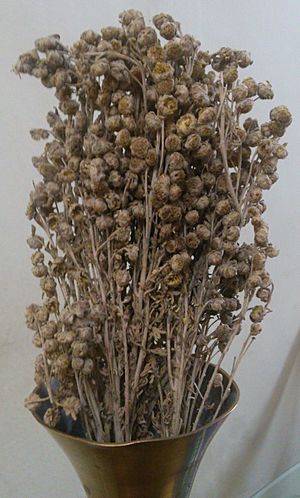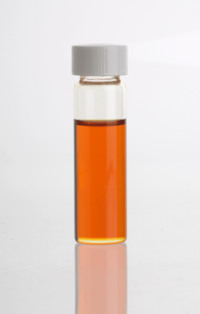Artemisia pallens facts for kids
Quick facts for kids Artemisia pallens |
|
|---|---|
| Scientific classification |
|
| Kingdom: | Plantae |
| Clade: | Tracheophytes |
| Clade: | Angiosperms |
| Clade: | Eudicots |
| Clade: | Asterids |
| Order: | Asterales |
| Family: | Asteraceae |
| Genus: | Artemisia |
| Species: |
A. pallens
|
| Binomial name | |
| Artemisia pallens Wall. ex DC.
|
|
| Script error: The function "autoWithCaption" does not exist. | |
Script error: No such module "Check for conflicting parameters".
Artemisia pallens, also known as dhavanam, is a special plant. Its name "dhavanam" comes from the ancient Sanskrit language. In different parts of India, it's called by names like ಮರಿಕೊಳುಂದು (marikolundu) in Tamil or दवणा (davana) in Marathi. This plant is an aromatic herb, meaning it has a strong, pleasant smell. It's a type of xerophyte, which means it's good at living in dry places.
The dhavanam plant has small yellow flowers that grow in clusters. These clusters are called racemes or panicles. The plant often looks grey or white because its leaves are covered in soft, silky hairs. Its leaves can be deeply divided, almost like a feather (called pinnately divided), or like fingers spreading out from a palm (called palmately divided).
Growing Davana Plants
People grow dhavanam plants on farms because their leaves and flowers smell so nice. There are two main types of these plants. One type is shorter and flowers earlier. The other type grows taller and flowers later.
You can grow dhavanam from seeds or from cuttings. It takes about four months for the plant to grow big enough. The bottom part of the stem becomes woody, but new branches grow each year. You can find dhavanam mostly grown in the Indian states of Andhra Pradesh, Karnataka, Maharashtra, and Tamil Nadu.
Interestingly, the larvae (young caterpillars) of many butterfly species love to eat Artemisia pallens.
What Davana is Used For
The leaves and flowers of the dhavanam plant are used to make a special liquid called "oil of Davana." This is an essential oil, which means it's a concentrated liquid that contains the plant's natural scent.
Uses of Davana Oil
- Davana oil is very popular in making perfumes. It gives perfumes a sweet and fruity smell.
- The leaves and stalks of the dhavanam plant are also used to make beautiful bouquets and garlands. They are used in both fresh and dried flower arrangements.
- In some traditions, davana blossoms are offered to Shiva, an important god in Hinduism. People place them on his altar as a sign of faith.
See also
 In Spanish: Artemisia pallens para niños
In Spanish: Artemisia pallens para niños
 | Percy Lavon Julian |
 | Katherine Johnson |
 | George Washington Carver |
 | Annie Easley |



